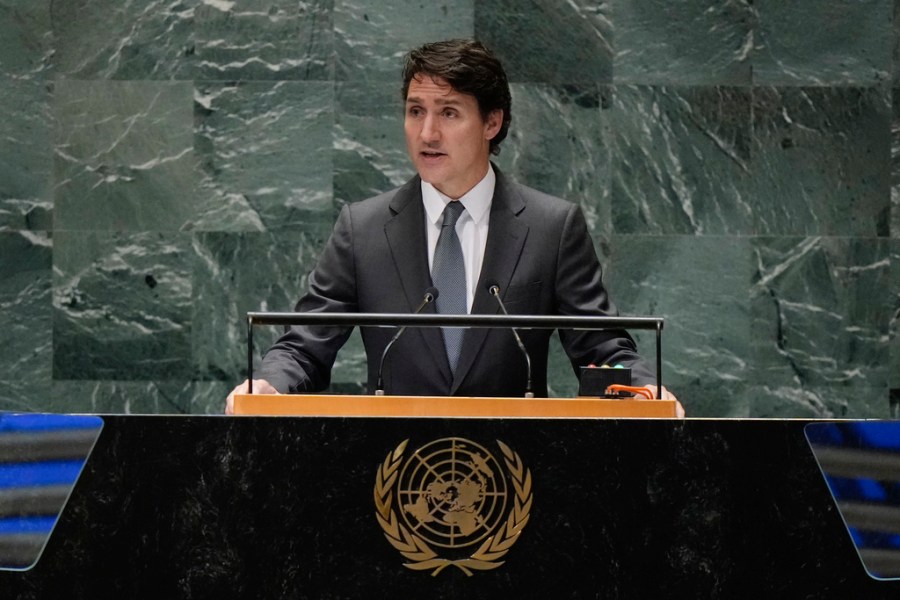
Justin Trudeau’s resignation as Canada’s prime minister, despite being politically forced, is nonetheless a rare demonstration of a leader stepping back and — intentionally or not — doing what’s best for his country. Many other leaders, past their sell-by date and perhaps actively causing damage, should take careful note and consider following suit.
Much can be said about how Trudeau squandered his position as the handsome face of global liberalism when he came to power in Ottawa 2015. He limps away as an avatar of progressive overreach, with Canada mired in scandals over crazy levels of immigration and every manner of wokeness — and that was his doing, because he truly is naïve.
Consider, for example, the 471,808 new permanent residents admitted in 2023. This influx has contributed to immigrants comprising 23 percent of Canada’s total population, the highest proportion in over 150 years. This has led to concerns over housing affordability and social services — but there is something else: Like their neighbors to the south, Canadians are a nation of nations and a mix of peoples, but they have also become a people of their own, in a way, to enough of a degree that a vast change in the culture is unwanted.
Trudeau seems not to know this, perhaps because of his roots in French-speaking Quebec, itself different from the rest of English-speaking Canada. He took multiculturalism, a good idea at heart, a step or two too far. His Liberals consequently lost their majority years ago and were forced to rule in a coalition that has now fallen apart — partly, perhaps, compelled by the coming conflicts with the incoming administration of President-elect Donald Trump in Washington.
If Trudeau were, say, Israel’s Benjamin Netanyahu, there would have been no end to the schemes, manipulations, gaslighting, legal maneuvers and dirty tricks. Anything for another second in power. Corruption trials, four recent inconclusive elections, poor health, his wife’s conviction, the catastrophic failure of Oct. 7, the ongoing hostage crises, and the majority of the Israeli public’s demand for an inquiry — nothing matters.
Trudeau instead chose to walk away, saying, “This country deserves a real choice,” acknowledging that internal battles within his party would make him ineffective in handling such challenges as inflation, anger over immigration and fractious politics.
This willingness to go quietly is rooted in a democratic instinct to preserve stability and offer renewal. As a consequence, Trudeau has a shot at being remembered for useful reforms, from cannabis legalization to childcare programs, even though his later years were marred by public discontent.
Netanyahu is currently the elected official causing the most damage to his country — for reasons I’ve described at length. But he is far from the only mulish insister — elected, autocratic or dictatorial — on eternal rule.
A partial list might include Vladimir Putin, who has clung to power in Russia since 1999, eroding democratic institutions, invading Ukraine, and isolating his country economically and politically. Xi Jinping in China, no longer subject to term limits since 2018, has centralized power, cracked down on freedoms in Hong Kong and Xinjiang, and heightened tensions over Taiwan, risking global instability.
Recep Tayyip Erdoğan in Turkey, in power two decades, has weakened democratic institutions, implemented disastrous economic policies, and polarized his society. Alexander Lukashenko in Belarus and Nicolás Maduro in Venezuela have transformed their nations into pariah states through repression, corruption and economic ruin. Meanwhile, long-term African rulers like Paul Biya in Cameroon (premier or president since 1975) and Yoweri Museveni in Uganda (president since 1986) have perpetuated stagnation, corruption and conflict. Daniel Ortega in Nicaragua has been befouling the landscape since the early 1980s.
The reasons for all of them to go are clear. Prolonged rule tends toward institutional decay, fostering corruption and inefficiency while stifling fresh leadership. These leaders erode public trust, polarize their nations, and provoke unrest or even violence. Their prolonged dominance frequently isolates their countries internationally, as with Putin, Lukashenko and Ortega, while undermining stability and economic growth, as with Maduro and Biya.
Leaders like Trudeau demonstrate the value of leaving at the right time, preserving both personal legacies and national resilience. For those clinging to power, voluntary exits might offer their nations the chance to heal, rebuild and move forward.
Consider the piggishness involved.
Putin, ruling the largest country in the world by territory, invaded Ukraine to seize more territory. Xi, competing with India for the world’s most populous nation, covets Taiwan’s population of 25 million more. Netanyahu, who has served more time than anyone else as Israel’s prime minister, sacrifices his country’s stability to buy himself more time in office.
Netanyahu leads Israel’s most religious-ever coalition. Clearly, the way to his heart might lie through Jewish wisdom — specifically, the Tenth Commandment, which I believe deserves a place of honor. “Thou shalt not covet.”
France’s King Louis XIV famously declared, “L’État, c’est moi” (“I am the state”). This is a widespread delusion. Louis XIV died in 1715, France’s monarchy soon followed, and the world kept spinning on its axis. The king is dead; long live the state!
Dan Perry is the former Cairo-based Middle East editor and London-based Europe/Africa editor of the Associated Press, the former chairman of the Foreign Press Association in Jerusalem and the author of two books. Follow him at danperry.substack.com.












